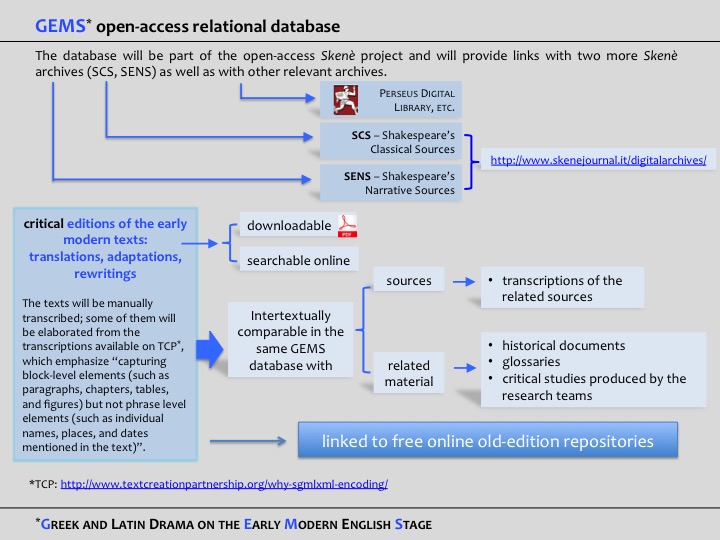Greek and Latin Drama on the Early Modern English Stage
The GEMS research project aims at starting off the first comprehensive study of the early modern encounter between English theatre and classical drama. It is common opinion that ancient Greek drama and the Shakespearean age represent the cradle of Western theatre, yet criticism has not fully illuminated how these two traditions actually dialogued. While studies have been produced on the dissemination of classical myths in major early modern works, there is still little awareness of the actual presence of classical drama in performance and print culture. Scattered studies – neither exhaustive nor updated – on the Englished Seneca have been produced, but how did the inception of tragic and comic forms in English theatre occur through the impact of ancient theatrical tradition upon medieval religious drama? And what role did European contemporary models and translations have in it? GEMS’s aim is to fill in this gap by examining the fortune of classical drama in early modern England. This will help respond to such questions as why Greek dramas circulated in Greek, Latin and English at different times and what impact they had thanks to/apart from their Senecan mediation; why Plautus became a favourite since the early sixteenth century or Aristophanes’ Plutus was edited and translated more often than other plays since the late sixteenth century.
The project’s target is twofold:
1) to identify a corpus of relevant primary texts circulating in England at the time, including Greek and Latin editions, Latin translations, English translations, and rewritings; these texts will be collected in an open-access digital archive dedicated to their consultation and to the exploration of the intertextual relations between source texts, translations, adaptations, rewritings, and relevant historical documents; this will be the first open-access relational database on the subject;
2) to produce critical studies on the processes of transmission of classical drama, on its diffusion, performance, and absorption by English theatre. In particular, the analysis will concentrate on:
a) the reception, edition, translation, and adaptation of Greek and Latin drama;
b) its influence as a complex dramatic model, including forms that were absorbed and re-elaborated for the early modern English stage (e.g. the chorus, the prologue, the epilogue, etc.).
This will require:
1) a philological analysis of the identified editions;
2) the study of the translative and adaptive processes with a focus upon the destination of the texts;
3) the investigation of the impact of the editions and/or translation of classical drama and of the European theatrical culture through the circulation of Italian playtexts especially.
The team will adopt a comparative stance based on an integrated approach, including competences of classical philology, classical and English drama (both medieval and early modern) as well as of digital and textual philology, linguistics, semiotics of theatre, performance and translation studies.

The Team
Prof. Silvia Bigliazzi, English Literature, Verona (leader)
Prof. Gherardo Ugolini, Classical Philology, Verona
Prof. Alessandro Grilli, Classics, Pisa
Prof. Elena Rossi Linguanti, Classical Philology, Pisa
Dr Francesco Lupi, Greek Literature, Postdoc, Verona
Dr Marco Duranti, Greek Literature, PhD, Verona
Dr Francesco Dall’Olio – PhD student Greek Literature, Verona
Dr Emanuel Stelzer – English Literature, Postdoc, Verona
